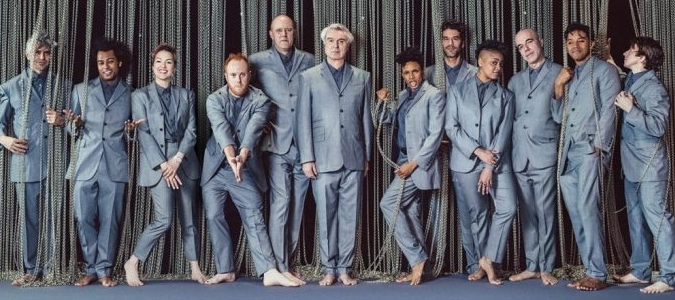

American Utopia
Opening Night: October 20, 2019
Closing: February 16, 2020
Theater: Hudson Theatre
Following a sold-out world tour, David Byrne’s acclaimed theatrical concert comes to Broadway. David Byrne’s American Utopia is the once-in-a-lifetime Broadway event that marks a major cultural milestone in the worlds of music and theatre. Innovative pop/rock icon David Byrne (Talking Heads, Here Lies Love) shares the spotlight with a diverse ensemble of 11 musical artists from around the globe. Together with choreographer Annie-B Parson and production consultant Alex Timbers (his collaborators on Here Lies Love), Byrne and ensemble deliver a show that’s as surprisingly poignant as it is supremely funky.
BUY TICKETSREAD THE REVIEWS:
October 20, 2019
Won’t you be his neighbor? David Byrne doesn’t actually make that request in “American Utopia,” his cloud-sweeping upper of a touring show, which opened on Broadway at the Hudson Theater on Sunday. Yet when the silvery, gray-suited pop star poses another musical question — “Will you breathe with me?” — you may find yourself thinking of the theme song of “Mister Rogers’ Neighborhood.” I’m not the first person to note similarities between Fred Rogers — the cardigan-wearing children’s television host (and the subject of a new Tom Hanks movie) — and Byrne, the New Wave musician who writhed into the spotlight performing “Psycho Killer” in the 1970s. But as I watched “American Utopia,” the comparison felt especially apt.
READ THE REVIEWOctober 20, 2019
Although they had been splintering since 1988, Talking Heads officially broke up the year before I graduated college and moved to New York. Perhaps if I had followed through on my longtime fandom, I could have seen them in concert, but no, dammit. Never mind that their eight studio albums had formed the sonic backbone of my teenage angst and pride, the closest I ever got to Heads live was watching Jonathan Demme’s concert film Stop Making Sense over and over as preparation for a high-school Air Band contest (I was drummer Chris Frantz). And while I’ve enjoyed many of frontman David Byrne’s solo projects (including the splendid, immersive musical Here Lies Love), I resigned myself never to see one of rock’s greatest, most inventive post-Beatles ensembles in the flesh. Had I three wishes, after world peace and a Manhattan one-bedroom, my third would be for Talking Heads’ emotional wounds to heal so they could play a kickass, five-hour set of tracks from 77 to Naked. At American Utopia, my wish was not granted, but I’m still grateful for the experience.
READ THE REVIEWOctober 20, 2019
In the first of several playful ruminations that punctuate his exhilarating theatrical concert, American Utopia, David Byrne holds up a model of the human brain and ponders how the hundreds of millions of neuro connections in a baby’s gray matter get whittled down as we mature into adulthood, discarding the unnecessary and conserving only those needed to define who we are and how we perceive the world. This follows the section-by-section cerebral breakdown of the opening song, “Here.” That combined introduction serves as an implicit challenge to the audience — to rewire our brains, rendering them more elastic, capable of change and of receiving the multifarious signals of this astonishing show on different levels. Teaming up with a crew of 11 prodigiously talented and hard-working musicians, backup singers and dancers of diverse ages and ethnicities, Byrne gathers a vibrant community onstage, over which he presides as part professor, part preacher, part partying proletarian. The sheer jubilation being transmitted by the performers, not to mention the dynamic staging, seem to demand a new kind of sensory intake. It’s less a concert than a participatory religious experience, honoring the primal pleasures of music, dance and song as collective celebration, a rite to be savored more than ever in dark times.
READ THE REVIEWOctober 20, 2019
One constant of David Byrne’s long and prolific career is his ability to grow a seemingly simple idea into something brilliant, whether it’s the melody of “Road to Nowhere” or the concept of the “Stop Making Sense” tour some 36 years ago, where the concept of bringing out nine musicians, one at a time per song, grew into one of the most iconic tours in modern music history. What is perhaps most remarkable is his ability to keep coming up new ideas that seem obvious, but obviously aren’t. To that end, the concept underpinning “American Utopia,” his 16-week Broadway show that officially launched Sunday, is equally simple in theory: A completely bare stage with “untethered” performers, bound by no wires or stationary equipment, moving more or less constantly throughout the show. As he described the concept to the audience at the Hudson Theater on Wednesday night, “It’s just us — and you.”
READ THE REVIEWOctober 20, 2019
One of rock’s great questions, a rung or two below Are You Experienced? and maybe Which One’s Pink? but still right up there, has got to be Why A Big Suit? David Byrne asked himself that in an early-MTV-era promo for Jonathan Demme’s brilliant Talking Heads concert film Stop Making Sense, posing a query about an image – the angular frontman all Dada’d up in a gigantic gray, V-cut suit – that itself was a signature pose of the 1980s. His answer had a bit to do with a love of geometric shapes but mostly reflected a desire to make his head seem small – a way, he suggested, of highlighting the physical, rather than the cerebral, in music. Of course the very contemplation of the matter funked things up more than a little; as, it turned out, shrunken heads are about as good at escaping attention as whispers. But of course Byrne knew that all along.
READ THE REVIEW





















